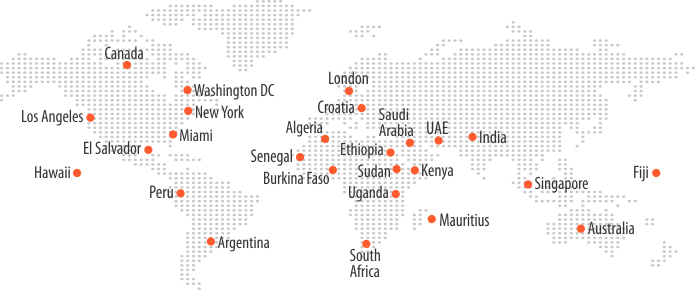Telecom Liberalization in Ethiopia: Amplifying ICT Market in Africa

With the expansion of the continent’s physical infrastructure and the liberalization of the telco sector, Ethiopia’s information, voice communication, and technological infrastructure also evolved. Heavy commercial expenditure in other areas of the economy was stimulated by industry competition. The result of liberalization also includes the creation of community-based organizations that continue to give communities the ability to direct their development and have unparalleled access to connectivity via VoIP Termination and ICT (information and communication technology).
Ethiopia started the liberalization of its telecom market as part of the strategy to use information and communication technologies to boost the nation’s economic development. It started the licensing procedure to distribute new telco licenses. The demographics of Ethiopia continue to be tempting to Voice service providers and telecom operators. In the previous years, the GDP per capita has more than doubled, and several businesses have access to funds that they can spend on seamless connectivity and telecom wholesale services.
Liberalization and Ocean of Opportunities for the Telecom Industry
The country’s desire to spur economic development by utilizing the results of technological innovations in the telecom industry acts as the foundation for telecom liberalization. Through its National Ten-Year Perspective Plan, Ethiopia has accepted its aspiration to be an African cornerstone of prosperity. The decision taken by the government to liberalize the telecom industry will allow it to address a number of impasses across the economy, including in crucial industries like manufacturing, logistics, education, and healthcare.
The telecom liberalization makes it easier for Ethiopian mobile phone users to make deposits into accounts saved through mobile wallet apps on their phones, transmit balances to others, including merchants of goods and services, and repay deposits for regular money, all of which help to modernize the economy.
A key component of digitizing Ethiopia’s economy is having widespread, dependable connectivity. Ethiopians from various sectors, as well as the government and organizations that wish to serve them, are anticipated to benefit greatly from connectivity in terms of access to telecom wholesale services as well as the ability to make digital payments. With an aim to take advantage of the incredible resources in terms of technology, and knowledge that global operators would bring to Ethiopia, the government will step up its efforts to develop a supportive policy environment.
Telecom Investments in Ethiopia
The two main draws for telecom investment in Ethiopia are its sizable potential market and expanding financial ecosystem. Ethiopia has a young populace. Given that hundreds of millions of Africans have recently begun using smartphones and the internet, Ethiopia, with a population of over 100 million, provides one of the most substantial opportunities in the digital economy for VoIP termination and telecom wholesale services providers.
Participants in the telecom sector are confident that while the Ethiopian telecom market is not yet fully developed, it has substantial growth potential thanks to the B2B sector and the government’s push for connectivity. Large potential bidders have indicated their interest in making investments, with extra capacity and funding for license and infrastructure, to ensure that coverage and benefits from their entry into the market are provided to all Ethiopians.
Digital Transformation of Ethiopia with ICT Innovations
The technological sector contributes to growth and is a crucial competitive enabler for other productive industries. The age of digital devices has already arrived. People in Ethiopia are intelligent, hopeful, connected, and tech-savvy. They are hard at work, identifying innovative solutions to issues involving public service delivery, healthcare, and digital finance.
The government of Ethiopia wants to use the information and communication technology sector to capitalize on Ethiopia’s strong advantages in manufacturing, agriculture, and service export. For instance, the nation is well positioned to support data centers and cloud servicing thanks to an extremely attractive electricity tariff. To achieve this, the government has finished the construction of a sizable ICT park that will house service export businesses, producers, and data centers. In order to guarantee that knowledge transfer and local capacity building are central to each of the new telecom licensees’ operations, the government will also collaborate with telecom wholesale service providers.
With the liberalization, Ethiopia has an incredible opportunity to benefit from the technical and operational expertise of the major international telecom industry players. In addition to launching Digital Ethiopia 2025 – A Digital Strategy for Ethiopia’s Inclusive Prosperity, the government also enacted legislation and institutionalized its implementation. Bold steps have also been made to make doing business in Ethiopia simpler and more rewarding.
The establishment of a national digital ID, the development of interoperable payment platforms, the bolstering of e-government applications, and finally, the facilitation of e-commerce were designated by the Ethiopian government as the four fundamental building blocks for the digital economy in this Strategy. Reforms in the telecom and power sectors help to sustain these. The nation is also making investments in cybersecurity and digital skills in tandem, and the positive results they are already seeing are a definite indication of the viability of their national development strategy. The increasing focus on the digital economy has already started to draw significant investments in the telecom technology solution and ICT park, particularly around data centers, digital innovation and training centers, device manufacturing plants, and business process outsourcing companies, enabling employment for hundreds of people.
Bankai Group – Paving Way for ICT Revolution in Ethiopia
Telecommunications and information technologies are being used more and more in almost every aspect of human endeavor around the globe. The internet and the wireless revolution have lately altered how people live and conduct business, and the telecommunications and information technology sectors have assumed a prominent role in global affairs and will do so for the foreseeable future.
The telecommunications sector is highly resource-intensive, complicated, and capital-intensive. The sector also needs workers with advanced technological capabilities and high ability levels, and these resources, including money, are not widely accessible in Africa. This is where Bankai Group can play a pivotal role in overhauling the telecom industry in Ethiopia as well as across the entire Africa.
With 30+ years of expertise in the telecom industry and VoIP termination, Bankai Group assists clients in becoming more flexible in delivering next-generation services through unique and dynamic telecom technological solutions. Bankai’s telecom solutions include VoIP termination services, messaging services, traffic monitoring, revenue assurance, fraud management, and other cutting-edge telecom technologies that enable comprehensive monetization of client requirements.






